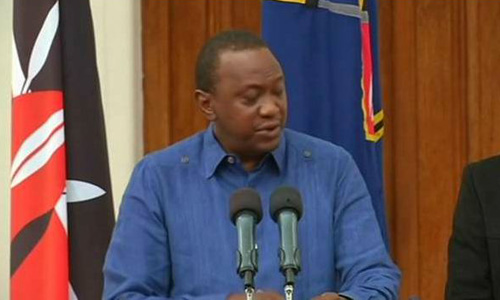Kenyatta says campus attackers 'embedded' in Kenya's Muslim community

KENYA - Kenya's President Uhuru Kenyatta said on Saturday that those behind an attack in which al Shabaab Islamist militants killed 148 people at a university were "deeply embedded" in Kenya, and called on Kenyan Muslims to help prevent radicalization.
His televised speech in response to Thursday's 15-hour siege at the Garissa university campus came after the Interior Ministry said five suspects in the assault had been detained, some while trying to flee to Somalia.
Four suspects were Kenyans of Somali origin, and the fifth was Tanzanian, the ministry said. The suspected mastermind, Mohamed Mohamud, a former teacher at a Garissa madrasa, is still on the run. Kenya has offered a 20 million shillings ($215,000) reward for his arrest.
"Our task of countering terrorism has been made all the more difficult by the fact that the planners and financiers of this brutality are deeply embedded in our communities," Kenyatta said.
"Radicalization that breeds terrorism is not conducted in the bush at night. It occurs in the full glare of day, in madrasas, in homes, and in mosques with rogue imams."
The attack at Garissa, which lies 200 km (120 miles) from the Somali border, has put Kenya on high alert and spooked its Christian communities after reports the gunmen sought out Christian students while sparing some Muslims.
Kenyatta's comments will put more pressure on Kenya's Muslim community, who make up about 10 percent of the 44-million-strong population.
More than 400 people have been killed by al Shabaab on Kenyan soil since he took power two years ago, including 67 people who died during a siege in September 2013 on a Nairobi shopping mall.
Earlier on Thursday, Somali militants vowed to wage a long war against Kenya and run its cities "red with blood".
In a message directed at Kenyans, the al Qaeda aligned group said the raid on Garissa was revenge for Kenya's military presence in Somalia and mistreatment of Muslims within Kenya.
"No amount of precaution or safety measures will be able to guarantee your safety, thwart another attack or prevent another bloodbath from occurring in your cities," the group said in an emailed statement received by Reuters in the Somali capital.
Four attackers died at Garissa, but Kenya has not named them or announced their nationalities. The authorities put their bullet-ridden, swollen bodies on display on Saturday, hoping that crowds coming to view the corpses might identify them.
The interior ministry said three suspects arrested at the border had coordinated the attack. Two were detained at the university, including a security guard and a Tanzanian man named as Rashid Charles Mberesero.
"We suspect the Tanzanian, who was hiding in the ceiling, was one of the combatants. He had ammunition with him when he was arrested on Thursday night," ministry spokesman Mwenda Njoka told Reuters. "We suspect the guard facilitated the entry (into the university)."
The Kenya Red Cross said it had found a woman survivor on Saturday in the university, two days after the siege ended.
NO GOING BACK
Al Shabaab's violence has dented Kenya's image and ravaged the country's vital tourism industry. The timing of the attack was embarrassing for Kenyatta, who a day earlier had berated Britain and Australia for issuing travel warnings for Kenya due to security threats.
Kenyatta rejected the notion that Nairobi has neglected Muslims and Kenyan Somalis, who say they are marginalized by the authorities.
But diplomats and analysts criticize what they see as Kenya's heavy-handed approach in trying to tackle al Shabaab, saying tactics such as indiscriminate mass arrests of the Somali population plays into the radicals' hands and fuels resentment among Muslims.
Garissa residents have reacted with fury to the massacre, and question why only two security guards were on duty despite warnings that al Shabaab was planning to target a university.
"You can't say this will be the last attack in Garissa," said construction worker Tobias Ayuka. "We are very worried."
Fearful of further assaults, owners of malls in Nairobi and the port city of Mombasa have sought greater government protection and ratcheted up private security.
"We are getting more armed police and plain clothes police officers. Everywhere is on heightened alert right now," said the owner of one high-end Nairobi mall popular with Westerners, speaking on condition of anonymity.
Along Kenya's palm-fringed coastline, where several resort towns cater mainly for Western tourists, police have deployed armed officers in major public buildings.
"Officers are everywhere both on the ground and in the air. We have two helicopters that will be patrolling the entire coastal area," Robert Kitur, police chief for Kenya's Indian Ocean coast region, told Reuters.
Garissa Governor Nathif Jama said the region has a number of security "soft spots", including schools and hospitals, and asked for more boots on the ground in his county, which forms part of Kenya's porous 700km border with Somalia.
Jama said Garissa University was shut indefinitely and some students said even if it reopened, they would not return.
"When I just manage to get out of this place safely, I'm telling you I'll never come back," said Sheillah Kigasha, 20, who survived Thursday's rampage by hiding under a bed. - REUTERS







